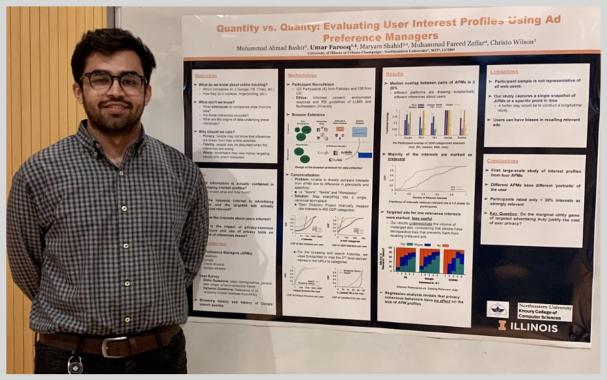
Umar Farooq, BSc Computer Science 2018, recently represented LUMS at the esteemed Applied Research Competition at New York University, Abu Dhabi campus from November 6-8, 2019. The competition is one of the leading student-run computer science events in the world. Mr. Farooq and his team won second prize at the competition for their research work on ‘Quantity vs. Quality: Evaluating User Interest Profiles Using Ad Preference Managers’.
The Competition was a part of CSAW – the largest student-run cyber security event in the world. It invites students from all around the globe to be in the running for the CSAW Best Paper Award. Accepted papers are presented during CSAW Finals. This competition has a reputation for drawing some of the best doctoral security research worldwide.
Mr. Farooq presented his LUMS undergraduate thesis work at the competition. The research was done in collaboration with Northeastern University and was completed under the supervision of Dr. Fareed Zaffar, Assistant Professor LUMS. It highlights that the widely reported privacy issues concerning major online advertising platforms (e.g. Facebook) have heightened concerns among users about the data which is collected about them. Even with a comprehensive understanding of who collects data on users, as well as how tracking is implemented, there is still a significant gap in the understanding of what information advertisers actually infer about users, and whether this information is accurate or not.
As part of the research, Mr. Farooq recruited 220 participants to install a browser extension which collected their interest profiles from four Ad Preference Managers (APMs). APMs are transparency tools offered by some advertising platforms that allow users to see the interest profiles which are constructed about them - such as Google, Facebook, Oracle BlueKai, and Nielsen eXelate. The data was then used to analyse the size and correctness of interest profiles, compare their composition across the four platforms, and investigate the origins of the data underlying these profiles.
Commenting on the importance of his research, Mr. Farooq said, “Our work has helped uncover the gap in the theoretical understanding of how data aggregators work and the empirical evidence of user relevance to the aggregated content. It was surprising to see that the interests inferred by key data aggregating companies are often perceived irrelevant and/or wrong by concerned users and lead to mistargeted ads. We also revealed that, contrary to common belief, despite adopting privacy conscious behaviours and ad-blockers, online user profiling was unaffected.”
Expressing his appreciation for LUMS in supporting this research, Mr. Farooq said, “Research has played an integral part throughout my time at LUMS, in shaping both my academic and professional careers. The rich and vibrant environment at the University, coupled with strong guidance by professors in the Department of Computer Science has greatly helped me in exploring my interests and perfecting my skillsets. In particular, I am truly thankful for the guidance and counselling of Dr. Zaffar, who has been a great mentor and an even better friend. I would strongly encourage the current and incoming batches to participate in international competition in the field, since we are definitely at par with all the great universities in the world.”








